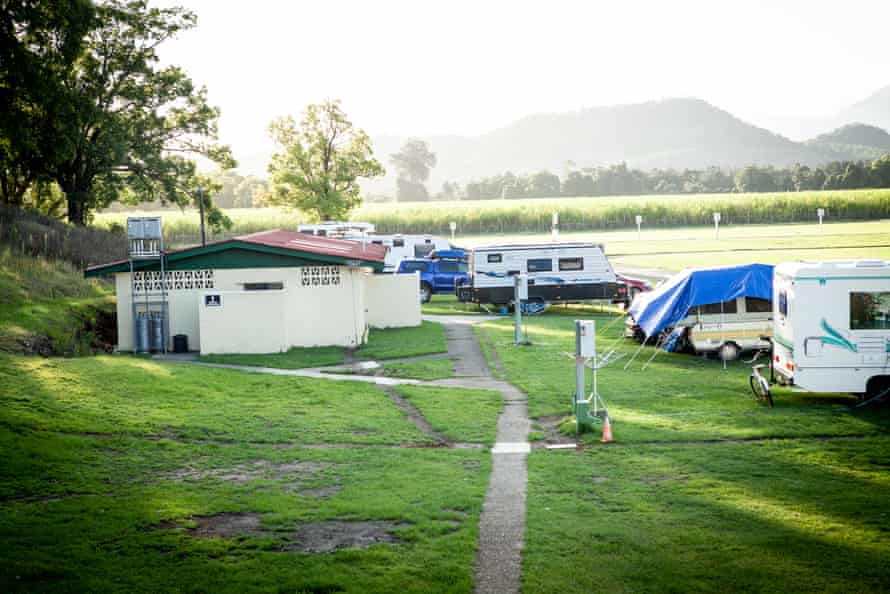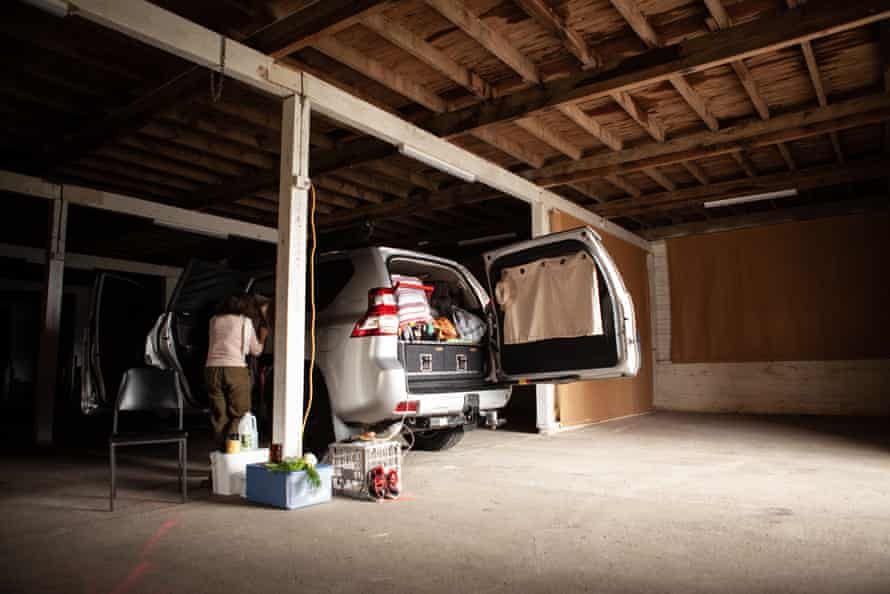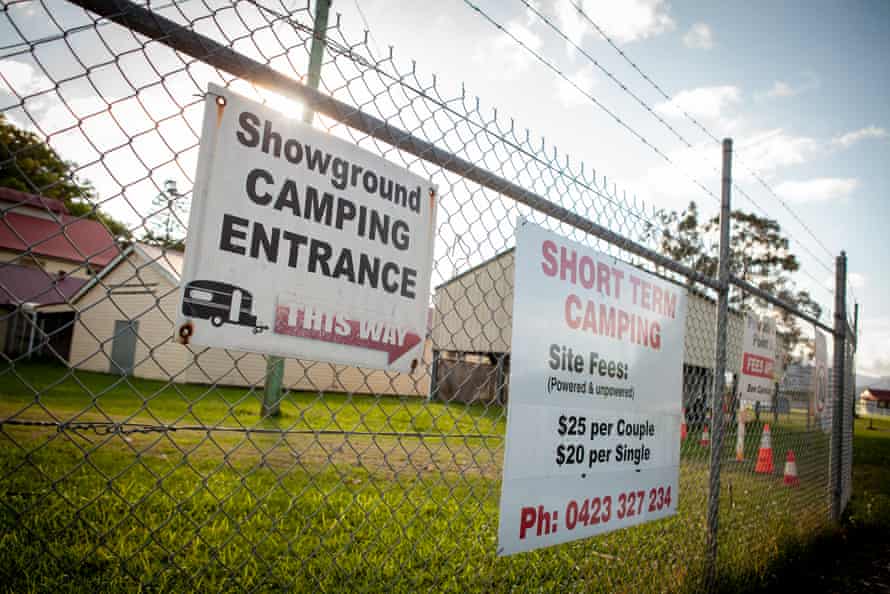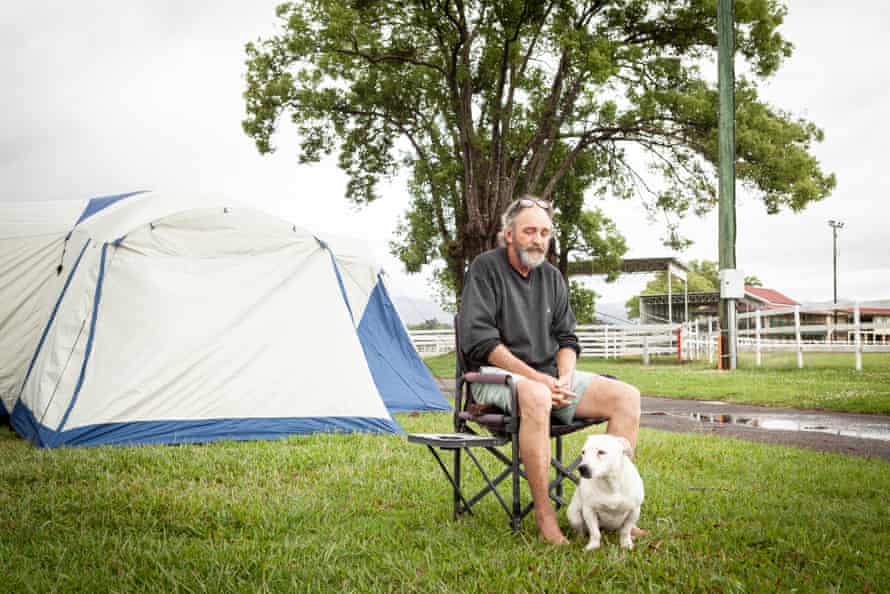Surrounded by cane fields that stretch out to the Border Ranges, the showgrounds in the northern New South Wales town of Murwillumbah are normally spectacularly pretty.
But this week, when the ranges were lost in mist and rain was coming down, it was decidedly desultory. In the camping area of the showgrounds, people have set up makeshift homes. Some this week were succumbing to depression and despair. Everything was wet: feet, socks, bedding.
Across the border in Queensland 20km away, they have homes, lives, jobs, families. Life goes on mostly as normal.
There are estimated to be hundreds of people stuck in the border zone between NSW and Queensland; many living as though homeless, reduced to accepting donations from the community; locked out, helpless, displaced and desperate.

Wendy, who had bought an old van to sleep in while she waits, is so traumatised she can barely speak. During the night, rain came pouring through the leaking roof and the awning had collapsed. “I just want to go home” is all she can manage.
On Sunday 8 August, the Queensland premier, Annastacia Palaszczuk, announced the closure of the border with NSW. All of the state was declared a hotspot. All visitors were denied entry except for limited exemptions, and returning Queenslanders had to pay for 14 days mandatory hotel quarantine.
. Eleven weeks later, the border remains closed and it is estimated that thousands of people remain locked out of the state.
Still paying mortgages, rates, rents, but unable to get home to work, many are running out of money, paying for accommodation in NSW and facing financial ruin.
One young family has been on the road for eight weeks with a bird, three dogs and a four-year-old child, carrying their belongings on a trailer.
Clara, a pensioner in her early 60s, has just found out that her Centrelink payments will be cut off in five days because she has been out of state for more than a month. “I am not there to meet my obligations.”
Down the coast in Iluka, 50-year-olds Nick Gaskell, an essential worker, and Lindy Avery, a caseworker in bushfire recovery, are speaking from a wet tent. “There is water everywhere inside the tent” says Avery. They sold their place in Shoalhaven, on the NSW south coast, and settled on a house in Queensland on 26 August, something they have been working towards for 30 years.
“When we left our property,” says Avery, “we drove all the way around so we didn’t go through Sydney or any hot spot.” They have since bounced around nine caravan parks along the coast, getting stuck in a lockdown in Kempsey, having to leave places because of existing school holiday bookings or because they have a dog, spending a week sleeping in the car in Yamba. Their belongings are scattered among friends. They are burning furniture they are carrying on a trailer along the way to lighten the load.

Without income coming in, “it is costing us thousands of dollars a week”, says Gaskell, “and there is no clarity on what is happening”. The option of flying from Sydney and going into quarantine managed by the Queensland government would, he says, “cost in excess of $20,000”. They would have to fly their dog, and find storage for their vehicle and belongings, which would all have to be left behind.
It is the lack of clarity, the anxiety of not knowing what is happening that is causing mental health issues, says Jenny DeGregorio. She and her family settled on a house in Queensland in July then went back to Victoria to sell their property there.
“A week later they closed the border,” she says. “We’ve been waiting since the end of July.” Since then she, her husband, pregnant daughter and granddaughter have been bouncing between friends, couch surfing. Her husband has a job in Queensland waiting for him.
“My issue is that nobody has the decency to tell you the timeframe,” DeGregorio says. “You call the Queensland Border Pass Office and they say it’s exceeding 10 days. OK, that’s fine, you know there is a strain on the system. But how many days are we looking at: 30, 60, 90, never? I have emailed everybody, everybody. Every morning I am going, ‘OK, am I going to get that phone call tonight?’ And then you go to bed and you go, ‘OK, I didn’t get it.’ So maybe I’ll get it tomorrow.’ And this is what causes mental health issues in people.”
‘We have a home to go to’
Chris Cherry, the mayor of Tweed Shire council, is getting harrowing emails from people pleading for help. “It is just so broken,” she says. “I’ve seen so many emails from people pleading their exemptions, saying that they’re happy to provide the security footage from their home showing that they’re not leaving their home, to have traces put on their mobiles or do anything, even wear anything, a locator device, to show that they won’t leave their home, just [to] let them get home.”

One email is from a man. “He is saying his wife is 13 weeks pregnant with a high-risk pregnancy and they are homeless. They are both fully vaccinated and have bought a home in Queensland. It could have happened to anyone, anyone could have been caught in these circumstances. They’re essentially in this no man’s land at the moment.”
Freda and Bob Norris were on their way to Queensland because Bob is very ill with cancer and recently had a stroke. “My husband is very unwell, he is out of his comfort zone and we have to keep moving around,” says Freda from their caravan at the Murwillumbah showground. They had sold up in country Victoria and bought a house in Queensland where he could be warm. “We have a home to go to.”
They set off on 27 August. They have spent the intervening weeks in caravan parks in locked down northern NSW. “We have tried to work out the government system for permits and it is just a nightmare,” Freda says. “We have got an exemption but it doesn’t seem to make any difference. And then they want you to fly in, we have got a cat. We’re just going around in circles. It is a waiting game. I am pretty strong mentally but other times you just fall apart.”
Rick Philipp Hul-Ruegg and their partner and pets have been waiting to move back to their Clifton Beach home in Queensland for eight weeks. “We are at the moment staying at the border bubble in Kingscliff, NSW,” Hul-Ruegg says. “Every day we are meeting mostly older returning Queenslanders who are camping on the side of the road, running out of funds, waiting for the borders reopening to travel back home.”
Back at the Murwillumbah showground, Glenn Venner arrived with only enough money for one night’s stay. But caretaker Meg Fallon opened her wallet and pulled out $100, a donation from locals that meant he could stay a week. Fallon has heard stories of properties in Queensland being ransacked and burgled once it is known that the owners can’t get back to them.

The extra days meant Venner could pitch his tent instead of sleeping in the front seat of his ute with his dog, Bronte. It gives him a chance to put his feet up, which have ballooned with swelling after his vaccination. Strapped on to the back of his ute are his dirt bike and belongings. He inherited a farm in Queensland when his father died and has been on the road from Tasmania for six months trying to get to it after being caught in a lockdown in Melbourne visiting his daughter. The farm was razed by bushfires last year and Venner is concerned about sheets of metal from the burned-out house flying around when the cyclone season starts.
“I borrowed money to do the trip and that ran out,” he says. Venner had budgeted for a month on the road, “so I have just been floating around the north of NSW”.
The community of Murwillumbah has a long history of helping those in need. They are donating money, food and rooms in their houses to keep people like Venner going.
Louise Egan has written on the Facebook page Homeless Outside QLD Due to Border Restrictions, which has 4,000 members, and published with permission here: “I have no income and am relying on my parents to support me. I have never felt so worthless in my life. Knowing that one day I will get to see my three sons in Brisbane keeps me going. I just want to go home.”
For now, says the Queensland premier’s office, those wanting to return to Queensland can only apply for border passes and exemptions.
“This is a difficult time for everyone,” Palaszczuk said at a recent press conference. “There are thousands of people applying for exemptions. Why are they applying for exemptions? Because the Delta virus is running rampant in NSW and we’ve seen an explosion of cases in Victoria. … We wouldn’t have an exemptions unit if that wasn’t happening in the southern states, and we wish for everyone to get these issues under control. It is a very, very difficult time for families, not just here, but families right across the country.”
There is no set date for the border to reopen.
Source: ‘I just want to go home’: the locked-out Queenslanders trapped in no man’s land